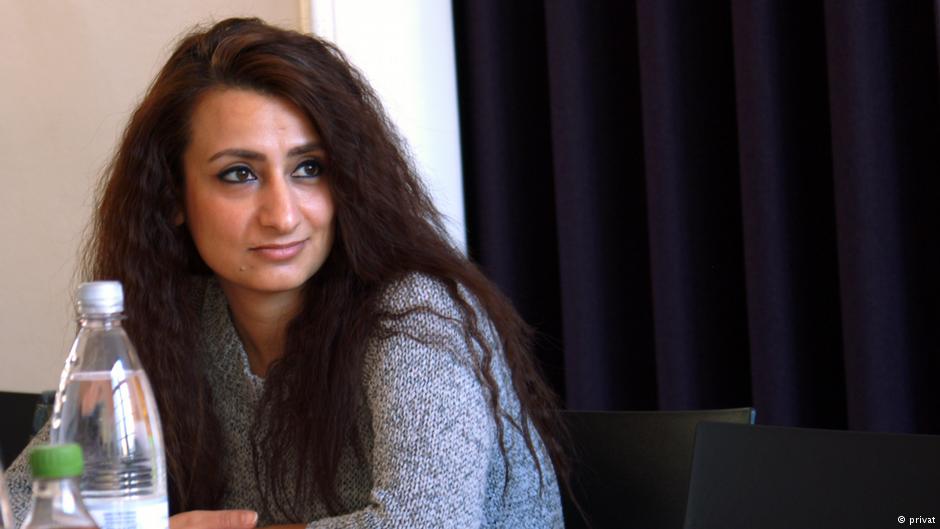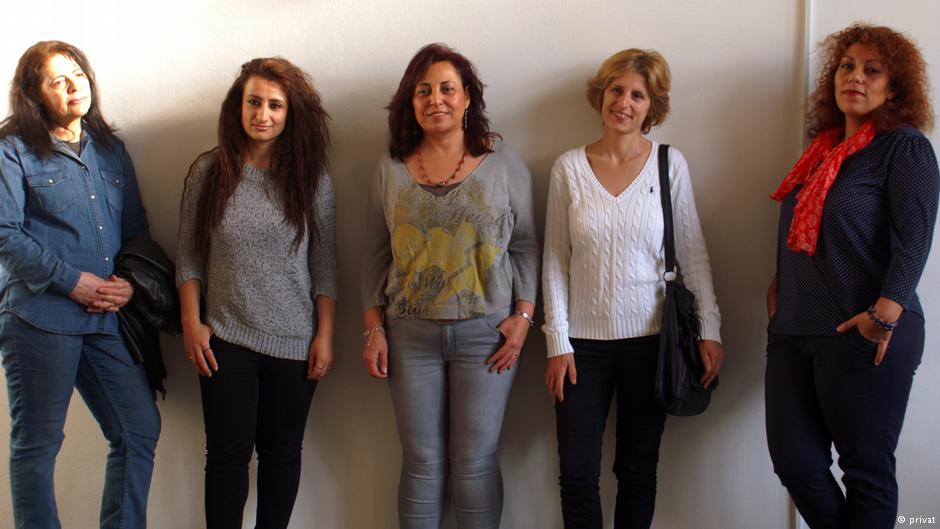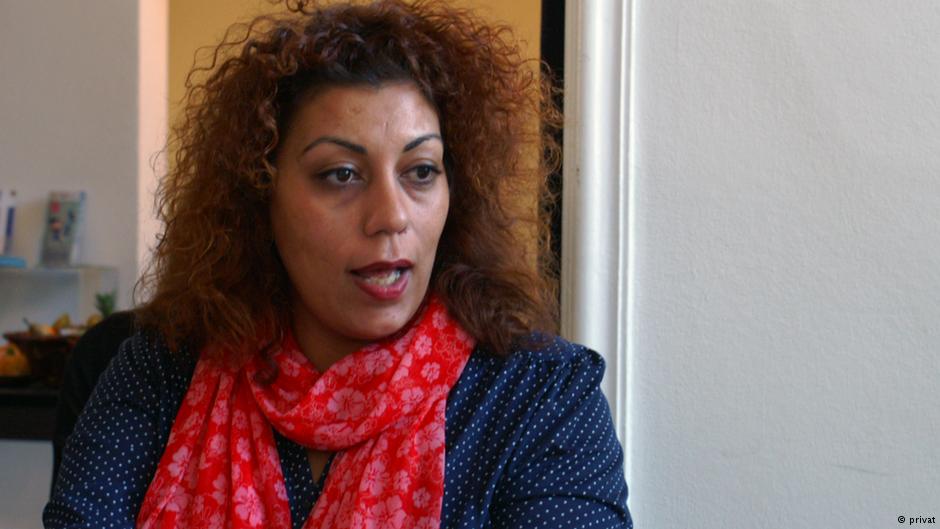A question of mutual interest

″You can't understand what 'refugee' means unless you've experienced standing in line for food at six o'clock in the morning, every day for many months. At first you think you're an exception, outside the game, and that you still have options. Because you're a writer, you have your creativity and you have a project of your own that you will eventually resume. Opportunity lies ahead of you and you have much to say. But then you come face to face with the new reality: you're a refugee, whether you're a writer, an artist, a musician or whatever you define yourself as – and here are you now, standing in line, waiting for your food, inching forward step by step.″
That's how the Syrian writer Rasha Habbal describes the ordeal of a writer in a country of refuge. From her own experience, Habbal, who is now known quite widely across Germany for her poetry, believes writers have a hard time making their way in a new country. She is subject to numerous pressures, most importantly the need to sort out details of residence, asylum and other bureaucratic requirements, which all keep her away from creating.
Difficulties on many levels
It hasn't been as easy as expected, Rasha Habbal continues: ″the most serious difficulty I have faced, apart from those we all share, is that having once been invited to a literary event, I was excluded the next time based on the assessment of the organisers who were Syrians like me. These invitations are often dependent on 'cronyism' and personal judgements that fail to give writers their due or treat them unfairly – after all, the German cultural scene is still far from knowing the truth because we write in another language. Apparently our problems have followed us here: we are still trapped in our own little communities.″
The daily issues that impinge upon the life of Syrian refugees are not the only ones that act as a burden on writers here. Language also emerges as a basic factor in conveying our literary output to the world and especially to German society.
The Syrian writer Lina Atfa says, ″Language is a luxury for us now. We have many matters that preoccupy us and oblige us to settle down, but we feel that we are learning the language under duress. Despite the fact that I as a writer own my language to a large extent, I deal with German like a child, which is something I'm not used to and it makes me feel weak.″

The basic problem faced by Widad Nabi, a poet from Syria, is that everyone she meets treats her as a refugee writer, in other words they treat her literary work as the output of a refugee and not of a writer. ″This phase we are going through is a temporary phase that will soon end. I would like to find someone who focuses on my work as a good text or a bad text. I need an institution that deals with my work as literature, rather than dealing with me as a refugee who happens to produce or accomplish something.″
Unlike some other female writers, Khawla Dunia isn't asking for writers to be treated any differently than other refugees. She thinks that would not be normal, but at the same time she believes that writers have an important role to play, because they can convey the ordeal of Syrians through their own experiences or the experiences of others, since they know how to put those experiences into words. ″If I were to talk about my own personal experience, I would have to say that I'm caught up in the bureaucratic machine: I now live in a small village and I'm learning the language, but I feel as if I'm under siege. I'd prefer to be in a place where I can be useful. I'm a writer and I'm political and an activist, but here all that counts for nothing.″
Diaspora literature
It's not known precisely how many writers have come to Germany or Europe as a whole since the Arab Spring, but a significant number have appeared in public at venues in Germany, as well as on the pages of German newspapers and magazines, which suggests that a diaspora literature is taking shape in the opinion of some critics, but can these experiments create a sustainable nucleus?
″We can now talk about two kinds of writers – those who were already writing inside their own country and those who started their literary activity here. All of them deserve to be respected. We cannot now say that we can definitely see clear signs of a diaspora literature, but the seeds of such a thing are undoubtedly taking shape, through poetry, short stories or novels about people's sufferings or through journalism in articles or in people's journals or chronicles, but we have yet to see a communal body of work that amounts to a phenomenon that can be called diaspora literature,″ says Khawla Dunia.
Tunisian writer Najet Adouani thinks there are some signs that an Arabic literary community is forming in Germany, either in the form of literature being written or in form of peripheral activities such as the newspapers and publishing houses that have been set up – developments which suggest there is an Arabic cultural community in Germany.

But will this literature merely wallow in nostalgia and a yearning for the past? Dunia says: ″Honestly, most writers don't know where they will end up. They might speak about their own suffering today, but maybe the same people will feel well integrated later and start writing about the new society they live in. Then the Germans themselves will be affected, because this is about a demographic element living alongside them.″
Writers may now be listening to and assessing each other's experiences, but do publishers and writers believe that we are now on the brink of a real diaspora literature movement? Abdul-Rahman Alawi, a Palestinian publisher who has lived in Germany for years, says, ″The presence of so many Arabs, especially from Syria, is bound to affect the degree of interest in the Arabic language among Germans. If there is intensive production and programmes are set up to support writers so that they are not dependent on society, I believe the outlines of an Arabic literature in exile will take shape in the long term. At the moment, however, even Arabic literature that is produced in the Arab world has no profile in Germany.″
Alawi adds: ″It′s a highly unusual situation – the German audience is likely to show interest in some affective aspects, but in the long term this will not affect the course of Arabic literature. The Arabic literature produced in Germany will not be a mirror image of literature in the Arab world. Instead it will be something that is independent per se; it may well play a subordinate role because the subjects will be a mixture of here and there. The meaning of the expression 'Arabic literature' or 'diaspora literature' or what language it is in needs to be analysed; studies must be carried out to lay proper foundations for it."
The role of translation and publishing
It obviously will not be possible to talk about Arabic literature in Europe, whether it comes from refugee writers or has been conveyed from the Arab world, unless there are specialist translators to translate these works from the original language. Publishing houses must also play a role in publishing and distributing these works in order to introduce them to readers in Germany and Europe in general.
Translator Larissa Bender suggests that, after the Arab Spring and the influx of refugees into Europe, Europeans realised that they knew nothing about the Arab world and that was because there weren't enough translators of Arabic literature – society′s mirror. Yet after 2011 publishers were not interested in translating works written by people who described their own lives. They published works by journalists and people who visited the Arab world maybe for a few months and then wrote about them on the basis of their limited experience. Later, when large numbers of refugees started coming to Europe, it posed a new challenge, but the response did not rise to meet that challenge. The media focused on individual stories and individual sufferings on the refugee trail, whereas there was no focus on writers and they did not try to understand those who had arrived in Europe.
Bender noted that after everything that happened the translators did not get contracts to translate any works of literature but only to translate stories of refuge – no substitute for translating works of literature. She says that those involved need to work on improving the situation through supporting women's literature and drawing up programmes and systems for translation by which translators can live and devising subsidised programmes that support both sides. Inviting writers to seminars, readings and events is not expensive.

But will this change the laws of publishing in Germany in the future? Piero Salabe of the well-known German publishing house Carl Hanser Verlag says, ″When we decide to publish a book we rely on the level of reader interest in the book and most of the time we don't have knowledge of the writers. We are not interested in a particular geography, but in literature as literature. I don't know if Arab readers or writers know much about young German writers. It is a complicated question relating to mutual interest: that of interest in the West and interest in the Arab world.″ Salabe notes that the most important criterion for publishing in Germany today is continuity and sustainability, not the language of the book. ″There are Arab authors, such as Rafik Schami for example, who have caught the interest of Germans, but he has been writing for some time and he is constantly producing work, but when we are dealing with a movement that lasts for a particular period or with works that an author produces and then stops, then that is something that is difficult to publish.″
Rama Jarmakani
© Qantara.de 2017
Translated from the Arabic by Jonathan Wright
